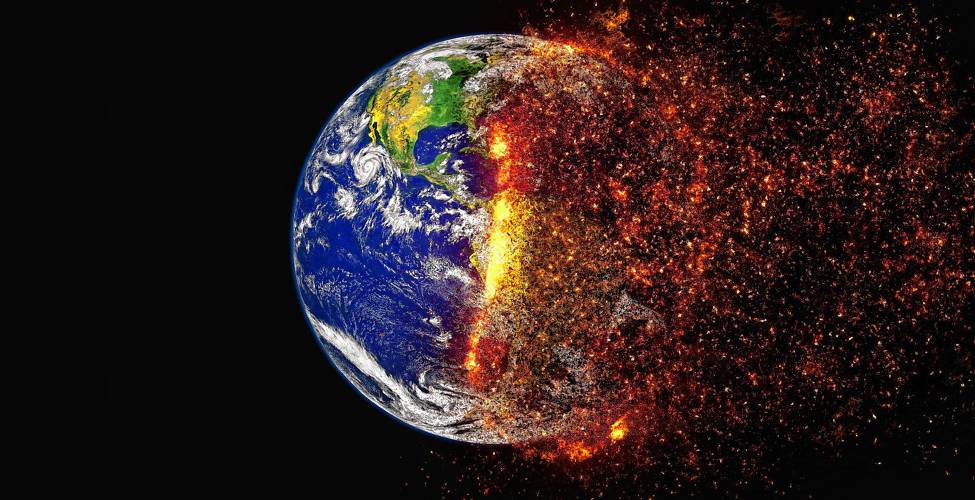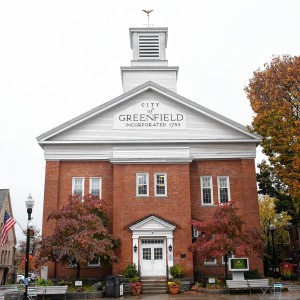Connecting the Dots: Ruination of nature should bring corporate death penalty
| Published: 06-14-2024 3:18 PM |
The enormity of the global climate crisis is contrasted with the actions of individuals trying to make a difference, echoing a David vs. Goliath narrative.
We are living in screwed up, scary and overwhelming times. As Rebecca Solnit wrote in the Guardian “Everything is weird and everyone is wrecked. This is maybe the biggest and least acknowledged truth of life in the United States and a lot of places beyond right now. It’s the pandemic; the eight years of Trumpism; the distortions, disruptions and corruptions Silicon Valley has promulgated and other looming menaces, including climate chaos.”
I have long been concerned, worried and freaked out about our climate chaos — the escalating damage to planet Earth primarily caused by corporate efforts to commodify nature in every possible way. Solnit writes “For those paying attention, climate change is also an immense moral injury, a reminder that we are part of a system shredding the beautiful tapestry of life on earth and devastating beloved species. Although Covid was a scourge across the globe,” Solnit writes, “far more people — about 8 million — die every year from breathing air polluted by burning fossil fuel, and that’s only one aspect of the devastation, and only to our species.”
Long-term efforts to improve public climate literacy, critical thinking about industry messaging, and understanding the scale of fossil fuel companies’ obfuscation and lobbying influence are vital for inoculating society against misinformation. We have many examples of environmental Don Quixotes tilting at the windmills of fossil fuel obfuscation such as Rachel Carson and Bill McKibbin. Here in Greenfield, we have Karl Meyer, who has for many years, gone up against corporate giant FirstLight Power, the operator of the Northfield Mountain Pumped Hydro Energy Storage facility. In his June 3 column, “Quabbin redux: The reselling of New England’s Great River,” Meyer writes that FirstLight regularly brings the Connecticut River to a dead stop by refilling an enormous reservoir for the purpose of releasing that water later to “provide horrifically wasteful resale electricity from this ravaged river to over-consuming coastal towns and metro-centers — reminiscent of the 1930s great Quabbin pillage.” Meyer, a member of the Society of Environmental Journalists, has interviewed FirstLight executives, conducted deep research, and has published his findings regularly in this newspaper. Now go to https://firstlight.energy/. You will be greeted with “Clean energy. Clear path. Common purpose.” And a video touting the FirstLight reservoir as a “huge, weird battery of the future … in supporting the transition to a clean energy economy.”
I will offer no comment since this is a family newspaper.
Thom Hartmann in his Substack column recently wrote “While the human death penalty has largely disappeared in the world and is fading in the United States (a good thing), the corporate death penalty needs a revival.”
“The corporate death penalty, widespread in the 19th century,” writes Hartmann, “is a political and economic process that weeds bad actors out of the business ecosystem to make room for good players. The process of revoking corporate charters goes back to the very first years of the United States. After all, the only reasons that states allow (“charter”) corporations (normal business corporations can be chartered only by a state, not the federal government) are to serve the public interest.”
Further research reveals that President Grover Cleveland, in his 1888 State of the Union address, said: “As we view the achievements of aggregated capital, we discover the existence of trusts, combinations, and monopolies, while the citizen is struggling far in the rear or is trampled to death beneath an iron heel. Corporations, which should be the carefully restrained creatures of the law and the servants of the people, are fast becoming the people’s masters.”
Article continues after...
Yesterday's Most Read Articles
Courts have consistently upheld a state’s authority to revoke charters for “a sustained course of fraud, immorality or violations of statutory law” that threaten public welfare. Charter revocation could still be a viable option for state enforcement against corporate misconduct, if political will existed. That said, political pressure from large corporations has largely prevented state officials from utilizing this accountability tool against them. Small companies are routinely shut down, mostly because they’ve become inactive or failed to pay their taxes.
President Barack Obama, in his State of the Union address in the House of Representatives one week after SCOTUS enacted Citizens United in 2010, said that the decision would “open the floodgates for special interests … to spend without limit in our elections” causing Supreme Court justice Samuel A. Alito to break decorum by mouthing the words “not true.”
Greenfield resident John Bos wants to see states step up to stop corporate commodification of nature by using their existing legislative power. His “Connecting the Dots” column is published every other Saturday in the Recorder. He is also a contribution writer for Green Energy Times. Comments and questions are always invited at john01370@gmail.com.








 Connecting the Dots: It comes to us all
Connecting the Dots: It comes to us all Ira Helfand: A bomb survivors warn of nuclear danger
Ira Helfand: A bomb survivors warn of nuclear danger Michelle Spaziani: High municipal employee turnover merits immediate review
Michelle Spaziani: High municipal employee turnover merits immediate review My Turn: Massachusetts’ health system is failing
My Turn: Massachusetts’ health system is failing
